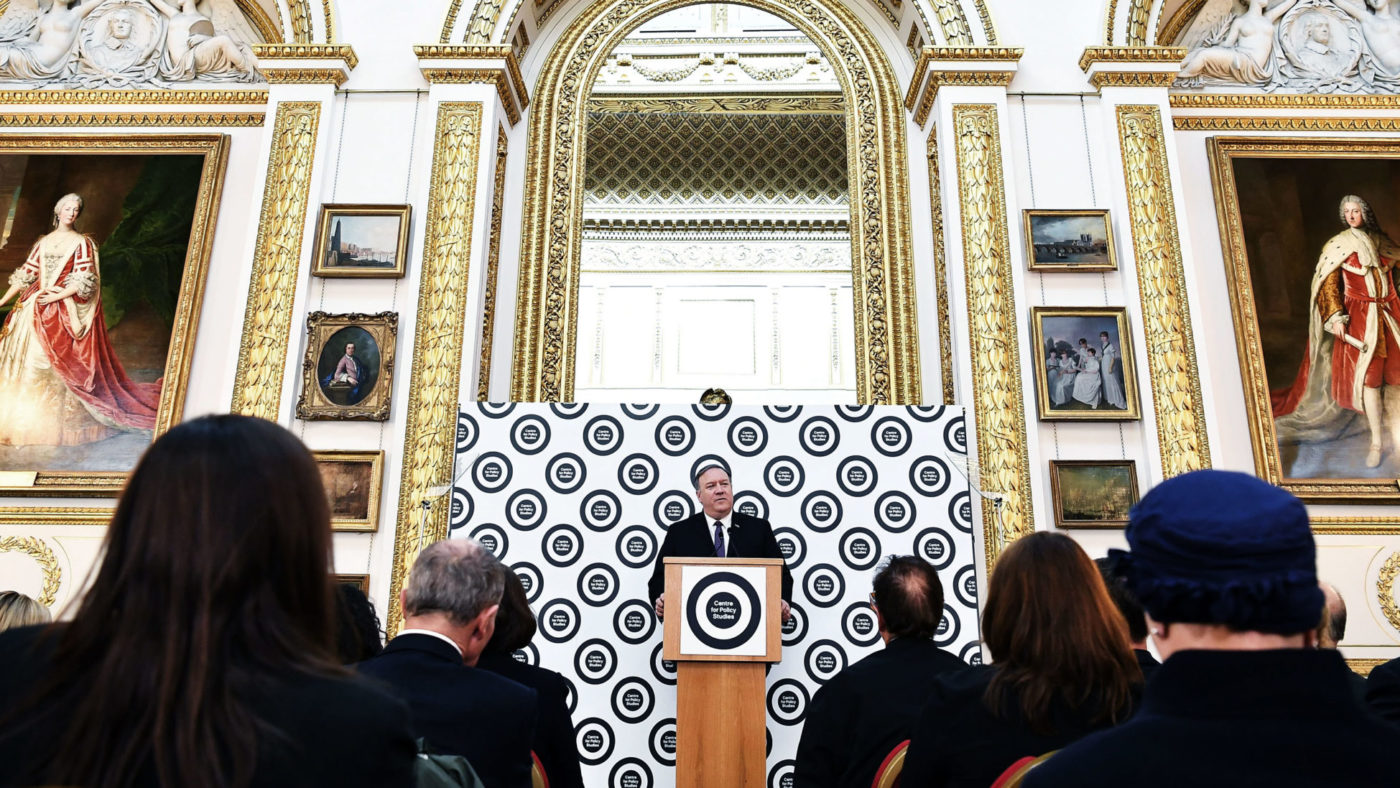Delivering the Centre for Policy Studies annual Thatcher lecture at Lancaster House in London on Wednesday, Secretary of State Mike Pompeo spoke to one of Washington’s most serious foreign policy concerns.
Namely, China’s influence over America’s top allies.
An ardent Atlanticist, Pompeo was clear that the Trump administration supports Britain. He pledged a continuing commitment deterring Russia and advancing a US-UK free trade deal. This fits with President Trump’s support for Britain on matters of national security. Support, incidentally, that is far more explicit than that President Obama offered.
Yet Pompeo was less positive about Britain’s relationship with China. “Would the Iron Lady be silent when China violates the sovereignty of nations through corruption or coercion,” he asked.
“I know it’s a sensitive topic, but we have to talk about sensitive things as friends. As a matter of Chinese law,” the Secretary of State continued, “the Chinese government can rightfully demand access to data flowing thru Huawei and ZTE systems. Why would anyone grant such power to a regime that has already grossly violated cyberspace?”
“Anyone”, here, meaning Theresa May.
Washington is alarmed that Mrs. May will accept limited Huawei access to Britain’s 5G network. While May will not formally make that decision until later this summer, former defence secretary Gavin Williamson’s firing has exacerbated the White House’s concern. Williamson was regarded as a resolute American ally for deploying Royal Navy vessels to support US freedom of navigation operations in the Western Pacific. His departure is lamented.
But Pompeo’s concern isn’t ultimately a reflection of personnel changes in the British cabinet. Instead, it reflects a matching of sentiment between the Trump administration and the broader US national security establishment.
First, the US now has a declared strategic vision to counter China’s international policy. Led by Xi Jinping, the administration believes China intends to displace the US-led international order of relative free trade and the rule of law, and replace it with a feudal mercantilist system. A system, that is, in which trade is made contingent on deference to Beijing on all major issues of politics and economics. Officials across the US intelligence community are increasingly convinced that China must be constrained rather than incentivised into compliance with the American-led order.
But Pompeo also fears that Theresa May’s entertaining of Huawei’s 5G access will delegitimate the special relationship. While the US recognises that Britain is desperate to secure post-Brexit trading arrangements to buffer its economy (hence Pompeo’s not so incidental pledge to push forwards a US-UK trade deal), the US fears Britain climbing into bed with Xi.
That’s not simply because the US believes Xi will jeopardise Britain’s broad support for US foreign policy. It’s more than that.
Pompeo’s intelligence agency joke stands out here. Mentioning Britain’s intelligence services support to their US counterparts, Pompeo added “I’m sure they were listening to me on my flight in. Yeah, that will come back to haunt me.”
The reference to “listening” is an implied hat-tip to GCHQ. Britain’s signal intelligence service is the NSA’s foremost partner and exceptionally well regarded by Pompeo from his time as CIA director. But continuing NSA-GCHQ teamwork is reliant on the trust that the secrecy of joint operations will be maintained.
The US believes even limited Huawei access to Britain’s 5G network would degrade that trust. But GCHQ’s own findings on Huawei methods and programs suggest the same. Still, this is just one side of the coin.
Because America’s underlying belief here is that China will use its access to Britain to gradually co-opt the British government outside of Washington’s orbit and influence. That via the dangle of new investments alongside increasing economic dependency and intelligence vulnerability, Britain will accept Chinese demands and increasingly ignore Washington on requests that that are, at least presently, aligned.
It must be noted here that the closeness of David Cameron’s government to China sits as a backdrop to American concerns. Cameron ignored US fears over Chinese ambition in relation to a new international order. So while the Trump administration likes Theresa May, on China, US confidence in Britain has been lacking recently.
Where does this leave us?
Well, ultimately, Pompeo’s speech was just a more overt version of what the Trump administration has been telling London for more than a year now. Washington truly fears increasing Chinese influence over the British government and economy. And it truly believes that this growing influence is incompatible with an enduring special relationship.
CapX depends on the generosity of its readers. If you value what we do, please consider making a donation.


